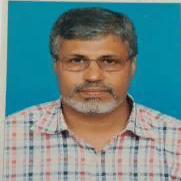
Babu Anto P
Work place: Kannur University, Kannur, Kerala 670567, India
E-mail: bantop@gmail.com
Website:
Research Interests: Image Processing, Image and Sound Processing, Natural Language Processing
Biography
Dr. Babu Anto P is a Retired Professor in Department of Information Technology, Kannur University, Kerala. He holds a Master of Science from Cochin University, Kochi, Kerala and Doctorate from Cochin University of Science And Technology, Kochi, Kerala. He has published more than 75 articles in reputed peer-reviewed National and International Journals. He has attended/presented the research papers in various Seminars, Conferences and Workshop at National and International level. He has also organized various Seminar and Workshop at National and International level. Under his supervision and guidance 7 Ph.D. degree were awarded and 2 are pursuing Ph.D. He has made significant contributions to research in the field of Machine Learning, Natural Language Processing, Image Processing and Speech Processing.
Author Articles
Malayalam Question Answering System Based on a Deep Learning Hybrid Model of CNN and Bi-LSTM Approach
DOI: https://doi.org/10.5815/ijmecs.2024.03.04, Pub. Date: 8 Jun. 2024
The Question-Answering (QA) approach represents one of the most significant Natural Language Processing (NLP) tasks that depends on language input. In terms of morphology & adhesive structure, Malayalam is a resource-constrained indigenous language of India. These linguistic features make QA in Malayalam particularly difficult. This study uses a subset of 5 tasks from the Facebook bAbI dataset to present a subset of five assignments from the Facebook bAbI dataset; this study presents a Malayalam Question Answering Solution that utilizes a Deep Learning (DL) hybrid framework combining CNN and Bi-LSTM Methods. We believe this is the initial time a hybrid-based deep learning framework has been used for the Malayalam question-answering technology. In the first iteration of the method, high-level semantic characteristics are extracted utilizing a Convolutional Neural Network. The Bi-LSTM tier then extracts the contextual feature representation of the text using the feature extraction result. Finally, use the softmax activation function to predict correct answers for corresponding questions. The proposed model is both functional and systemized in terms of classification accuracy, precision, recall, and F1 scores. The simulation results show that the proposed hybrid CNN and Bi-LSTM model outperform the existing models in terms of classification with more than 91 % accuracy for all five tasks.
[...] Read more.Developing an Intelligent Question Answering System
By Waheeb Ahmed Ajusha Dasan Babu Anto P
DOI: https://doi.org/10.5815/ijeme.2017.06.06, Pub. Date: 8 Nov. 2017
The goal of an intelligent answering system is that the system can respond to questions automatically. For developing such kind of system, it should be able to answer, and store these questions along with their answers. Our intelligent QA (iQA) system for Arabic language will be growing automatically when users ask new questions and the system will be accumulating these new question-answer pairs in its database. This will speed up the processing when the same question(even if it is in different syntactical structure but semantically same) is being asked again in the future. The source of knowledge of our system is the World Wide Web(WWW). The system can also understand and respond to more sophisticated questions that need a kind of temporal inference.
[...] Read more.Other Articles
Subscribe to receive issue release notifications and newsletters from MECS Press journals